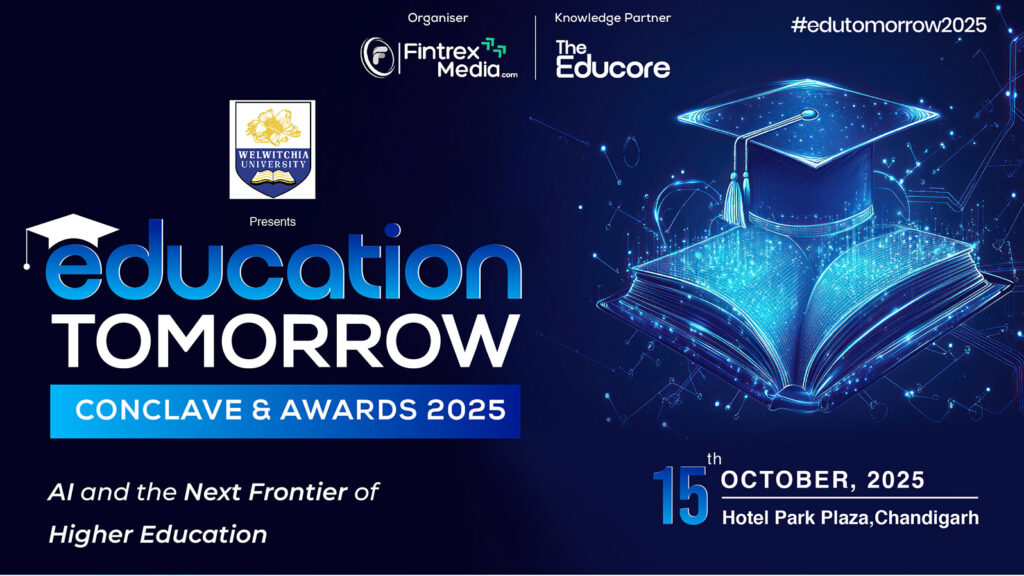Chandigarh | In today’s rapidly changing world, Artificial Intelligence (AI) is transforming every sector—from industry and research to education. For a young nation like India, the question of how to prepare the next generation for this technological shift has become crucial. With this vision, the Education Tomorrow Conclave & Awards 2025 will be held on October 15 in Chandigarh, under the theme: “AI and the Next Frontier of Higher Education.”
The objective is to explore how AI is not only redefining classrooms and pedagogy but also reshaping employment opportunities and skill development for the future.
A Timely and Relevant Initiative
Virtual labs, digital classrooms, AI chatbots, and personalized learning platforms are no longer distant possibilities—they are already a reality in universities and colleges. However, this progress raises vital questions: Will machines diminish the role of teachers? Will education become overly dependent on technology? And will human empathy get sidelined?
The Conclave aims to serve as a collaborative platform where academics, policymakers, and industry leaders can seek answers to these pressing concerns and chart the way forward.
Distinguished Guests
Two eminent personalities will grace the event as chief guests:
- Dr. Chandrashekhar Buddha, CEO – Anuvadini AI & Chief Coordination Officer, AICTE, Government of India
- Dr. Jatinder Pal Singh, Deputy Director, Higher Education Department, Government of Punjab
Their presence is expected to ensure that the discussions at the Conclave extend beyond dialogue to influence education policy and planning.
A Line-up of Education Leaders
The strength of the Conclave lies in its impressive list of speakers and participants, including Vice-Chancellors, directors, and education policy experts from leading universities across India. Among them are:
- Anshu Kataria, Chairman, Aryans Group of Colleges
- Prof. (Dr.) Manpreet Singh Manna, Vice-Chancellor, Chandigarh University
- Dr. Manoj Manuja, Vice-Chancellor, Geeta University
- Dr. M.L. Gaur, Chief Advisor, Rawatpura Sarkar Group of Institutions & Academic Board Member, BHU
- Prof. (Dr.) Devendra Sharma, Vice-Chancellor, HRIT University
- Dr. Sanjay Bahl, Vice-Chancellor, Indus International University
- Ankur Gill, Director of Operations, SVIET
- Prof. (Dr.) Vijay Kumar Banga, Director, Govind Ballabh Pant Institute of Engineering & Technology, Uttarakhand
- Subarno Bhattacharya, Assistant Director, O.P. Jindal Global University
- Dr. Amit Jain, Director, Inderprastha Engineering College
- Prof. Honey Sharma, Campus Director, Gulzar Group of Institutes
- Prof. (Dr.) Gurpreet Singh, Director – Online, Chandigarh University
- Prof. (Dr.) Pankaj Gupta, Executive Director (CESM) & Senior Fellow, Jindal India Institute, O.P. Jindal Global University
- Prof. (Dr.) Parvinder Singh, Former Vice-Chancellor, Rayat Bahra University
- Dr. Raghuveer V.R., Pro-Vice Chancellor (Academic Affairs), Chandigarh University
- Prof. (Dr.) Raman Deep Saini, Director-Principal, Chandigarh Business School of Administration
- Dr. Ashwani Kumar Bhalla, Former Deputy Director & Principal, Department of Higher Education, Punjab
- Dr. Monica Pendukeni, Co-Founder & Council Chairperson, Welwitschia University
AI: Partner or Disruptor?
One of the central debates will focus on whether AI is a disruptive force in education or a collaborative tool that strengthens the role of teachers. From admission analytics and student counseling to personalized study plans, universities are already deploying AI-based systems. While these tools improve accessibility and efficiency, they also raise concerns about data privacy and the loss of the human touch in education.
As one senior education expert notes: “AI should not be seen as a replacement for teachers, but as a tool that enhances their capabilities. True education still lies in the bond between teacher and student.”
Bridging the Gap Between Academia and Industry
Another key discussion point will be addressing the skills gap between academia and industry. Today, industries demand not just degrees but practical skills. AI has already revolutionized recruitment, training, and skill development. HR and L&D leaders will participate in the Conclave to help bridge this divide and align academic training with real-world needs.
Why Chandigarh?
Choosing Chandigarh as the host city is symbolic. Known for its leadership in both education and administration, the city represents the aspirations of emerging educational hubs in India, positioned strategically between Punjab and Haryana.
Recognition Through Awards
The event will also feature the Education Tomorrow Awards 2025, which will honor institutions and individuals who have pioneered innovations in AI, digital learning, and skill-based education.
Why This Conclave Matters
As India heads toward becoming the world’s largest working-age population in the coming years, preparing its youth for the future is paramount. This Conclave is not just a forum for ideas but a platform for policy direction and practical solutions. That is why it has drawn national attention.
The Road Ahead
For India to lead in technology-driven education, it must strike a balance—between innovation and inclusivity, between technology and human values. The Education Tomorrow Conclave & Awards 2025 is more than an event; it is the beginning of a national dialogue on the future of higher education. It will set the course for how India’s education system not only adapts to the future but also helps shape the global narrative in the decades to come.

